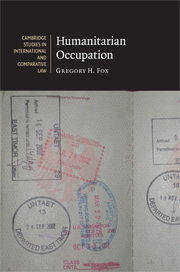Book contents
- Frontmatter
- Contents
- Acknowledgments
- Introduction
- Section I Historical antecedents
- Section II Why humanitarian occupation?
- Section III Legal justifications
- 6 Conventional legal justifications
- 7 The international law of occupation
- 8 Reforming the law: the Security Council as legislator
- Conclusions
- Index
- CAMBRIDGE STUDIES IN INTERNATIONAL AND COMPARATIVE LAW
7 - The international law of occupation
Published online by Cambridge University Press: 02 February 2010
- Frontmatter
- Contents
- Acknowledgments
- Introduction
- Section I Historical antecedents
- Section II Why humanitarian occupation?
- Section III Legal justifications
- 6 Conventional legal justifications
- 7 The international law of occupation
- 8 Reforming the law: the Security Council as legislator
- Conclusions
- Index
- CAMBRIDGE STUDIES IN INTERNATIONAL AND COMPARATIVE LAW
Summary
The third legal argument for international administration rests on the international law of occupation. Occupation law governs the acts of states in temporary control of foreign territory. This argument asserts that multilateral humanitarian occupiers are in essentially the same position as individual occupiers and should enjoy the same prerogatives, as well as the same restrictions. Specifically, it asserts that occupation law permits the kind of democratic political and legal reforms pursued by humanitarian missions. The American occupation of Iraq – during which Iraqi legal, political and economic institutions were thoroughly reshaped to more closely resemble those of western developed states – is the central example of unilateral actions proving a model for multilateral occupiers.
Professor John Yoo has been the most forceful proponent of an expansive reading of occupation law. Testifying shortly after the Iraq occupation began, Professor Yoo argued that occupiers have broad discretion to reform the occupied state, both to institutionalize democracy and human rights protections and to ensure the occupier's own security. “Occupying nations possess the authority to dismantle institutions that pose a threat to domestic or international peace and order, such as the Nazi regime in Germany. Commentators have also construed state practice to include all of the legitimate purposes of war, such as the promotion of democracy and the protection of fundamental human rights.”
- Type
- Chapter
- Information
- Humanitarian Occupation , pp. 218 - 272Publisher: Cambridge University PressPrint publication year: 2008
- 1
- Cited by



